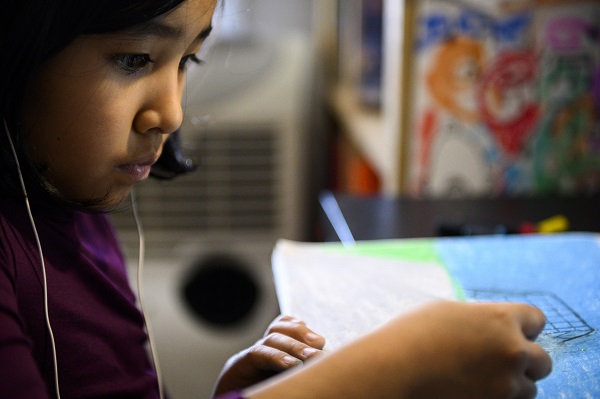 Credit: UNICEF Luxembourg
Credit: UNICEF Luxembourg
UNICEF Luxembourg has presented the main findings of the "COVID Kids" study, carried out in partnership with the University of Luxembourg.
The COVID-19 pandemic has had an unprecedented impact on the lives of children. Many believe that since children are less likely to show severe symptoms of coronavirus, they are less affected by this crisis. Conversely, children are directly affected by this situation and their well-being has suffered.
In Luxembourg, measures have been taken to mitigate the effects of the spread of coronavirus. The closure of schools, the inability to participate in recreational activities, home confinement and disruption of daily habits have affected children in particular.
Sandra Visscher, Director of UNICEF Luxembourg, explained: “Since there is very little data on the subjective well-being of children in Luxembourg, and even less in the context of the pandemic, we supported the COVID Kids study from the University of Luxembourg. As the largest children's rights organisation, it is not only important to give children a voice, but also to listen to them to better understand their experiences and the challenges they face".
From May to July 2020, researchers from the University of Luxembourg interviewed nearly 700 children aged 6 to 16 across the Grand Duchy to understand the impact of the pandemic on their subjective well-being as well as their daily experiences and their home education, in particular. They added group interviews to this large-scale online survey.
Dr Claudine Kirsch, Director of the COVID Kids project, stated: “The rights of the child include hearing from children [the right to be heard]. This was not the case in the first phase of the pandemic and their voice was largely absent in the debates around COVID. The objective of our study was not only to listen to the lived experiences of the children but also to ensure that their voice could inform future responses given at different levels such as government, ministries, teachers and educators, health professionals, as well as parents".
The main findings of the study are summarised as follows:
- Children's satisfaction with life has dropped dramatically: from 96% before the pandemic to 67% during lockdown
- Their satisfaction with school has declined: from 91% before the pandemic to 76% during the pandemic for primary school pupils and from 84% to 62% for secondary school students
- Some groups of children reported significantly lower levels of emotional well-being than others. These were children aged 11 to 16, children from disadvantaged socio-economic backgrounds and girls.
- Children most missed their friends and family during the school closures and lockdown
- While 63% of primary school children reported doing well with homeschooling, only 44% of secondary school students reported the same.
- Almost a third of children said they often or very often feared getting sick or seeing someone close to them getting sick.
Dr Pascale Engel de Abreu from the University of Luxembourg explained: “Our study identified four factors in particular that have a strong influence on well-being and that can be acted upon. Science can help develop solutions, for example through the development of promising interventions. Our study can provide avenues for the development of such interventions. We hope that our results can provide support for policy makers and people on the ground to reduce the negative effects of the pandemic on the well-being and mental health of children".
To support the study and to present the results in an understandable way, UNICEF Luxembourg and the University of Luxembourg have created three short films (available on YouTube) and a covidkids.lu website. The latter contains simple and practical tips to help children and adolescents understand and deal with the situation and their emotions, as well as tips for taking care of themselves. The website also contains tips for parents to help them cope with parenting challenges.
Beyond these practical tools, additional measures at all levels of society are needed to help improve the well-being of children in Luxembourg. To this end, the University of Luxembourg and UNICEF Luxembourg have drawn up a list of recommendations, such as enabling children and parents to access prevention and support services to promote children's well-being and long-term mental health, ensuring that schools convey messages of well-being and stress prevention in children according to their age and listening to children and encouraging them to express their concerns and ideas. They also recommended investing in clear and accessible communication with children that is appropriate for their age, creating spaces to ensure children's participation, arranging homeschooling so that students have regular contact with their teachers and classmates, gathering disaggregated data on children and investing in research to better understand the impact of COVID-19 on their well-being, as well as investing in the development of research to better understand the experience of the most vulnerable children during this pandemic.








